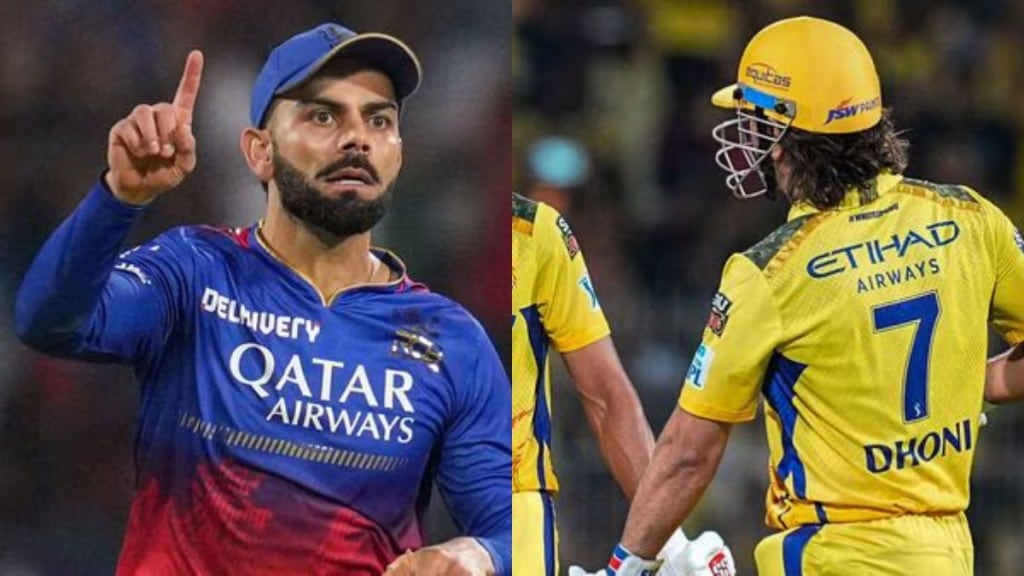The greatest rivalries in franchise cricket history will reach their crescendo at the Chinnaswamy Stadium in Bengaluru on Saturday. Royal Challengers Bengaluru will clash with Chennai Super Kings in a knockout for a place in the playoffs. From MS Dhoni’s impressive record against arch-rivals in Bengaluru to RCB’s narrow victory by a solitary run in a last-ball thriller in 2019, from Virat Kohli and Faf du Plessis’ formidable opening partnership to the economy rates of the CSK spinners this season, from Ravindra Jadeja’s 37-run assault on Harshal Patel to RCB’s notable performance on the 18th of May – here’s a look at the statistics that have defined this significant southern India derby, both historically and in the current tournament.
Look at numbers
18: It might be attributed to numerology by believers, while skeptics might call it luck. The 18th of May holds special significance for the Challengers and Virat Kohli. RCB has never lost a T20 match on this date in the IPL, securing four victories, including two against CSK. Kohli has played a pivotal role in three of these four triumphs. Here is the list:
– RCB beat CSK by 24 runs (2013), Kohli – 56* (29)
– RCB beat CSK by 5 wickets (2014), Kohli – 27 (29)
– RCB beat KXIP by 82 runs (D/L) (2016), Kohli – 113 (50)
– RCB beat SRH by 8 wickets (2023), Kohli – 100 (63)
65.63% – CSK has dominated the head-to-head rivalry with RCB, winning 21 of the 32 matches between the two franchises, resulting in a winning percentage of 65.63%. They have been particularly dominant at home in Chepauk, securing 8 victories in 9 matches. The last time RCB defeated CSK in Chennai was during the inaugural edition in 2008. The statistics are more balanced at the Chinnaswamy Stadium, with CSK narrowly leading RCB 5-4. However, CSK has triumphed in four of the last five encounters at this venue.
1 – RCB achieved a thrilling victory by a solitary run against CSK in a last-ball cliffhanger at the Chinnaswamy Stadium in 2019. Chasing a target of 162, CSK faced early setbacks, losing four wickets within the powerplay. An exceptional solo performance by MS Dhoni brought them tantalizingly close to the target, ultimately falling short by just a couple of runs. Dhoni remained unbeaten with a remarkable 84 off 48 deliveries, featuring seven sixes, a knock widely regarded as one of his finest in the IPL.
37 – Ravindra Jadeja unleashed a barrage of hitting against Harshal Patel during the 20th over of the CSK innings in Mumbai in 2021, smashing 5 sixes and a four and accumulating 37 runs in the over. This performance stands as the joint-most expensive over in IPL history.
413 – MS Dhoni boasts an impressive record at the Chinnaswamy Stadium against the Challengers, accumulating a total of 413 runs at a remarkable strike rate of 174.3. He has achieved four half-centuries in 10 innings against RCB at this venue.
10.2 vs 8.7 – Saturday’s highly anticipated clash will primarily revolve around the competition between RCB’s heavily reliant top-order batting lineup and CSK’s disciplined bowling unit. RCB boasts an impressive run rate of 10.2, ranking third-best in the season after KKR and SRH. Conversely, CSK stands out as the most economical bowling unit with an impressive economy rate of 8.7.
8 & 10.1 – CSK has also demonstrated their prowess as the most restrictive bowling unit during the middle overs, maintaining an economy rate of 8. Additionally, they have excelled at the death, with an economy rate of 10.1, showcasing their effectiveness in containing opposition batsmen throughout the season.
37 vs 17 – The ongoing season has witnessed an abundance of sixes, with the all-time record being surpassed as early as the 64th encounter. Teams that have embraced risks and capitalized on the powerplay overs have enjoyed considerable success. In this aspect, RCB holds a distinct advantage over CSK, having hammered 37 sixes during the powerplay compared to just 17 by CSK. RCB has maintained an impressive run rate of 10.1 in the first six overs, whereas CSK has been relatively slower, scoring at 8.7 runs per over during this phase of play.
592 vs 300 – RCB’s standout asset in the tournament has undoubtedly been their formidable opening partnership featuring Virat Kohli and Faf du Plessis. Together, they have amassed an impressive total of 592 runs at a striking rate of 174.1, establishing themselves as the most prolific opening duo of the season. In contrast, CSK has encountered challenges at the top of their batting order, experimenting with three different combinations. Their opening partnerships have contributed just 300 runs at an average of 23.1 and a strike rate of 130.4, falling significantly short of expectations in the competition.
224.7 – Rajat Patidar has emerged as a key figure in RCB’s recent resurgence in the tournament, showcasing his prowess as the destroyer-in-chief. One notable aspect of his batting is his dominance against spin bowling. Patidar has amassed an impressive 182 runs from just 81 deliveries against slower bowlers in the tournament, boasting a remarkable strike rate of 224.7. This places him fourth in terms of strike rate against spin among all batters who have faced a minimum of 30 balls this season, and notably, he holds the top position among middle-order batsmen in this regard. Patidar’s upcoming battle against the likes of Ravindra Jadeja and Maheesh Theekshana could prove pivotal in shaping the outcome of Saturday’s contest.
Shivam Dube, typically known for his proficiency against spin bowling, has experienced a notable decline in his performance during the latter half of the tournament. Despite his initial success, Dube’s numbers have faltered in recent matches. He has managed to score 83 runs off 50 deliveries against spinners, maintaining a respectable strike rate of 166. However, it is worth noting that spinners have been responsible for four out of his ten dismissals, averaging 20.75 in those instances.

